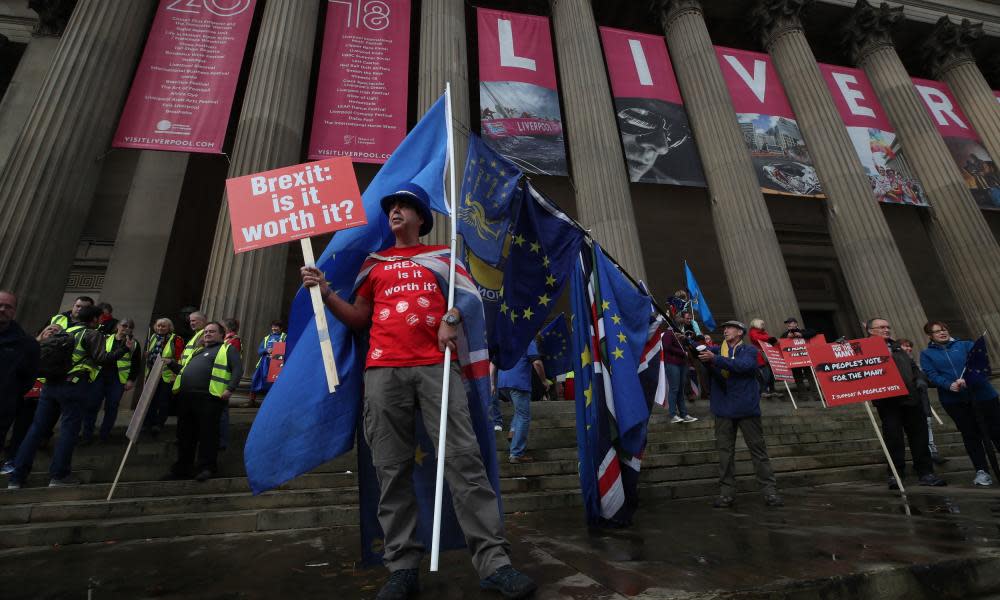Labour backing a second referendum shows democracy is working beautifully

People always say politics is ugly to watch up close, and they’re talking about the cynicism and manipulation, the treachery, the low cunning beneath the high rhetoric. Democracy in action is ugly in a different way, more like a jumble sale: mess, chaos, mountains of tedium, elbows everywhere. You have to stay alert because you know that underneath the polyester there’s something – not wishing to overextend an analogy, let’s call it a second vote on Brexit – that you would treasure.
The Labour conference in Liverpool this week had that jumble sale feel. In any process that is remotely pluralistic, there are too many people in the room. And so 150 Labour delegates met to discuss their composite Brexit motion, boiling 150 motions from different constituency parties down to one single motion, which was passed this afternoon.
It was a heroic, multi-houred marathon on which there were scores of perspectives, none of which was “Hallelujah”. Most of the motions that were fed in had a strong anti-Brexit flavour, and were firmly supportive of a referendum on any deal. They were opposed by a loose collection of the cautious, lefty Brexiters and ultra-loyalists who would prefer not to hold the leadership to anything. The final motion read as a series of conditional measures: if the government is defeated, but if a general election isn’t called, then Labour will campaign for a public vote, whose terms are yet undecided.
The post-match analysis seemed to be that this was a defanging of the members, all the better to roll them over later. In fact, this is what participation looks like: frustrating, iterative, inconclusive and interpretable. I’m told one memorable point of the meeting was Keir Starmer saying: “Right, now we have to agree what we mean by ‘consensus’.” The mind boggles as to how they kept it to five hours.
In a period of flux, as a party moves from one version of democracy (nominal) to another (meaningful), proceedings are garishly splenetic. The week began with a vote on proposals from the party’s year-long democracy review. From the outside, it all looks ridiculous, tautologous, self-referential: what kind of a party has, as the first line of its agenda, a battle over its own rules?
At its kernel, inevitably, was the issue of how easy it is for local party members to deselect their Labour MP. Momentum wanted mandatory reselections, which would see all Labour MPs face a selection battle against challenger candidates before every general election. It got another fudge instead: a lower threshold for triggering a full reselection selection process. Now it will happen if a third of local party branches and affiliated trade union branches express dissatisfaction with the local MP, rather than a half.
The argument in favour of mandatory reselection is unremarkable and straightforward. On the one hand, if an MP is chosen by party members, why should that choice be immutable? Circumstances change; the composition of the party changes; MPs change. My local MP, Kate Hoey, appeared at a Brexit rally last week with Nigel Farage and David Davis. The idea that Hoey represents Vauxhall Labour party – which is fiercely anti-Brexit – is flat-out silly. On the other hand, internal contests use energy that could be directed elsewhere – towards one’s political opponents, for instance.
It’s a debate that could play out quite reasonably, both sides having clear elements of truth and strength. But emotions run so high that pragmatism doesn’t get a look-in. MPs who oppose mandatory reselection say their duty is to all their constituents, not just to Labour party members, much as a parent is bound to love all their children equally. The MP Stella Creasy delivered a stinging critique of “toxic” Momentum at a rally: “If you think being political means sitting in meetings … you can do one.”
If a political party is to mean anything, there has to be a mechanism that connects members to its decisions. Those members must, by definition, carry more weight than constituents who aren’t members, with the obvious proviso that anyone who wants more weight can always join. Otherwise, it’s not a democratic party – it’s a kind of political burlesque, where MPs put on a show of representation and party members distinguish themselves by cheering the loudest.
But democracy is extremely painful: even if everyone were courteous, which we know they aren’t, participation is challenging. It doesn’t respect seniority. People cannot really be disciplined, only persuaded. Being political actually does mean sitting in meetings, and worse: having no control over who else is in the meeting, or what they think.
It has become fashionable to say, in weary amusement, that Labour is replaying the 1980s; that this is a cul-de-sac in which it has lost itself before, from which it will sooner or later emerge. But the goal is not to return to a Labour party where we can all move along because there’s nothing to see: it’s a pluralistic ecosystem so densely populated that differences cannot be obliterated by fury or stamped out by discipline, only resolved through creativity.
Two days after that composite meeting, Starmer committed to a second referendum with a remain option on the ballot. It was all anyone wanted: not to erase the referendum, just to revisit it in light of the disaster of its unfolding.
It was, as one conference delegate described, the result of “ordinary people making sound decisions, for the many not the few”. That’s the distinction of democracy. It’s ugly to see its workings, but it’s beautiful when it works.
• Zoe Williams is a Guardian columnist

 Yahoo News
Yahoo News 
